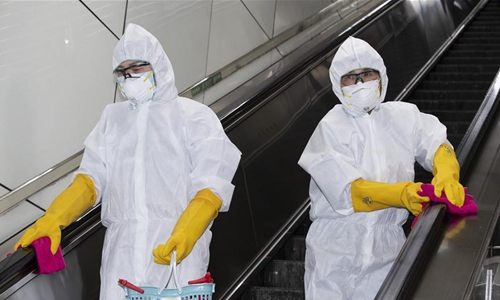Experts warn China to pay attention to S.Korea's COVID-19 cluster
By Sun Haoran Source:Globaltimes.cn Published: 2020/5/14 3:19:05

Staff members disinfect Gwanghwamun subway station in Seoul, South Korea, Feb. 28, 2020. Photo: Lee Sang-ho/Xinhua
Chinese experts said that South Korea was moving too early and quickly to lift restrictions after the East Asian country detected a cluster of COVID-19 cases in its capital Seoul, and warned that China should be vigilant to keep this from happening domestically.
They said this was particularly prudent as China had re-imposed "closed-off management" in Shulan, in Northeast China's Jilin Province due to a surge of infections.
"Entertainment venues, such as bars, clubs and movie theaters, should not be opened too soon as these places are usually congested where the virus can easily be transmitted from person to person," Zhou Zijun, a public health expert at Peking University, told the Global Times on Wednesday.
"Strict measures should be taken in those places if the ban on them is lifted to make sure everyone who goes to the venues can be tracked," said Zhou.
Coronavirus screening has surged in South Korea since authorities there introduced anonymous testing, officials said Wednesday, as they scrambled to tackle a nightclub cluster amid concerns anti-gay prejudice could impede the response, AFP reported on Wednesday.
Seoul officials said that as of Wednesday, 119 cases nationwide had been linked to the Itaewon cluster, according to AFP.
South Korea has been heralded worldwide as an example of a country that effectively contained the first major COVID-19 outbreak through broad-based testing and tracing contacts of infected individuals.
But the surge of new coronavirus cases which was caused by the cluster in venues in Seoul's Itaewon district - including several gay clubs - has sparked fears of a second coronavirus wave and forced authorities to delay this week's planned re-opening of schools, said AFP.
"It is difficult to track some customers as they didn't leave their real phone numbers at reception before entering bars in the district," Yang Zhanqiu, deputy director of the pathogen biology department at Wuhan University, told the Global Times on Wednesday.
"China has done a good job in terms of tracing infections, especially the adoption of health QR codes," said Yang. "By scanning the code on the cellphone on the bus or subway, everyone's health and travel information can be traced."
The QR codes, produced with the mobile app Alipay, are based on the users' movements over the previous two weeks and tell whether users have been to virus-hit areas, reported Xinhua.
Many nightclub customers are believed to be reluctant to come forward because of the stigma of being gay in the socially conservative country, said AFP.
Seoul authorities began carrying out tests anonymously this week to address such concerns, and mayor Park Won-soon said more than 8,300 people were tested in the city on Tuesday, compared to around 1,000 per day last week.
China has seen such a surge domestically as well.
The vice mayor of Jilin city, in Northeast China's Jilin Province, said Wednesday that the city will implement closed-off management of residential communities to tighten prevention and control measures in the region, CGTN reported on Wednesday.
On Tuesday, six new cases were reported in Jilin city, all were domestically transmitted. The new cases could be traced directly to one confirmed case in Shulan city, where an infection cluster was previously reported, said CGTN.
"China should pay close attention to the new surge in South Korea and keep such a thing from happening domestically," said Yang.
"China should control and quarantine local outbreaks, take measures in emergency management, and actively use health QR codes to track suspected infections," Yang noted, adding that "China should keep increasing its virus testing capabilities and research and development of a vaccine at the same time."
RELATED ARTICLES:
Posted in: SOCIETY,ASIA-PACIFIC,WORLD FOCUS